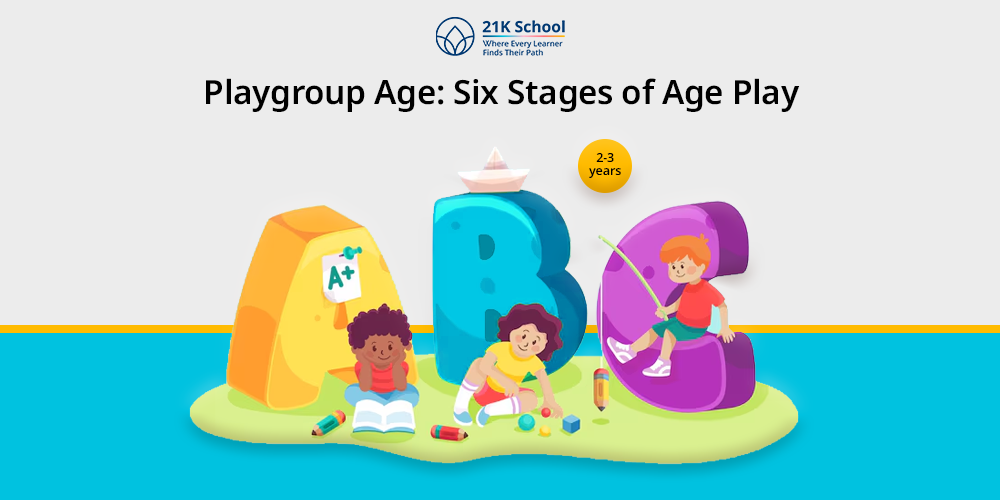
Have you ever thought about what is the right age to indulge students into playgroups?
Playgroup age is the typical age standard in which children start to engage in playful activities. Play group age is divided into some categories such as playschool, nursery, LKG and UKG.
These groups are also used for enrollment of children into preschool. The age division of playschool is 2-3 years or 18 months to 3 years, for nursery the age group is 3 to 4 years, for LKG the age group is 4 to 5 years and for UKG it is 5 to 6 years.
Even though the play group age varies from students to students as well as school policy. However, age 2 is considered as ideal for playgroups, even though some schools accept students in 18 months as well.
In play groups children learn to play and indulge in activities which helps in cognitive development of children . It is important for parents to understand the ideal play age group for taking in decisions.
Contents
What is Playgroup Age?
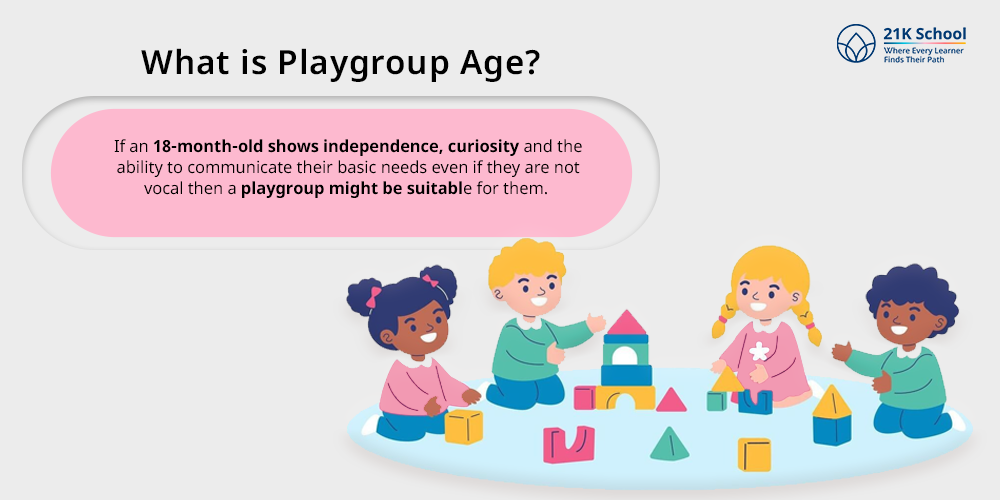
Many parents wonder: Is my 18-month-old ready for playgroup?
If an 18-month-old shows independence, curiosity and the ability to communicate their basic needs even if they are not vocal then a playgroup might be suitable for them.
A child’s individual growth maturity and ability to cope with being separated from families can be understood as they are well prepared for the playgroup. Many playgroups accept children as early as 18 months or even after 1 year based on childrens development .
Playgroup age can be understood as the stages of children’s age in which they start to play and develop curiosity among kids . The stages of the playgroup are divided into subgroups which start from 2 years to 3 years or 18 months to 3 years.
At the developmental stage children become curious, communicate with others, develop interest to learn new skills and so on. The playgroup age follows a structure that allows children and their parents to understand the pattern of the educational structure.
What is the Right Age to Start a Playgroup in India?
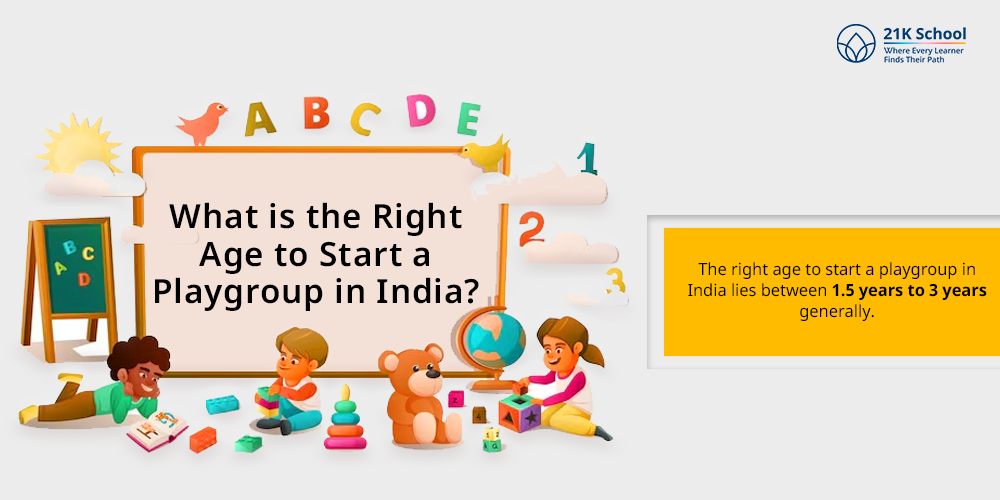
The right age to start a playgroup in India lies between 1.5 years to 3 years generally. There are no defined rules or guidelines defining the minimum age to start a playgroup in India. So, the right playgroup age depends on the playgroup policies and regional guidelines only.
During the period of 1.5 years to 3 years, many toddlers try to walk independently, start showing curiosity, and try to communicate with the people around them. So, it can be the right time for the toddlers to start playing in a structured yet entertaining learning environment.
Another factor focusing on the right playgroup age for your child can be his/her development pace. Some kids show visible signs of growth more quickly than others at the same age.
So, considering all these factors, you can easily find the right playgroup age for your child.
| Stage | Age Range |
| Play Group | 1.5 – 2.5 years |
| Nursery | 2.5 – 3.5 years |
| Lower KG (LKG) | 3.5 – 4.5 years |
| Upper KG (UKG) | 4.5 – 5.5 years |
| Class 1 (Primary School) | 5.5 – 6 years |
Types of Play Age Group
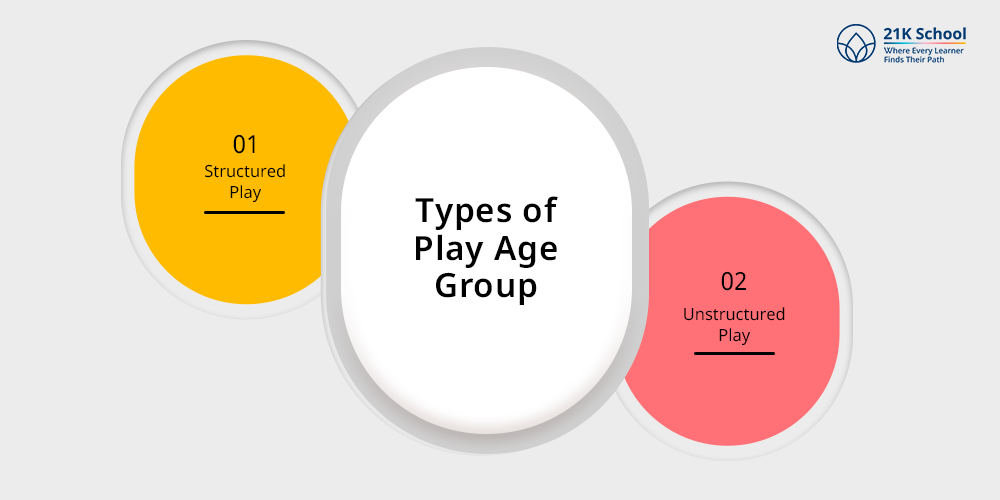
Play Age groups are basically divided into two groups known as structured and unstructured. Structured play is a type of play in which children have to follow the same guidelines.
Both the play groups are considered as important because it allows them to develop cognitive skills as well as enhance their confidence. Here are the types of play age groups.
1. Structured Play
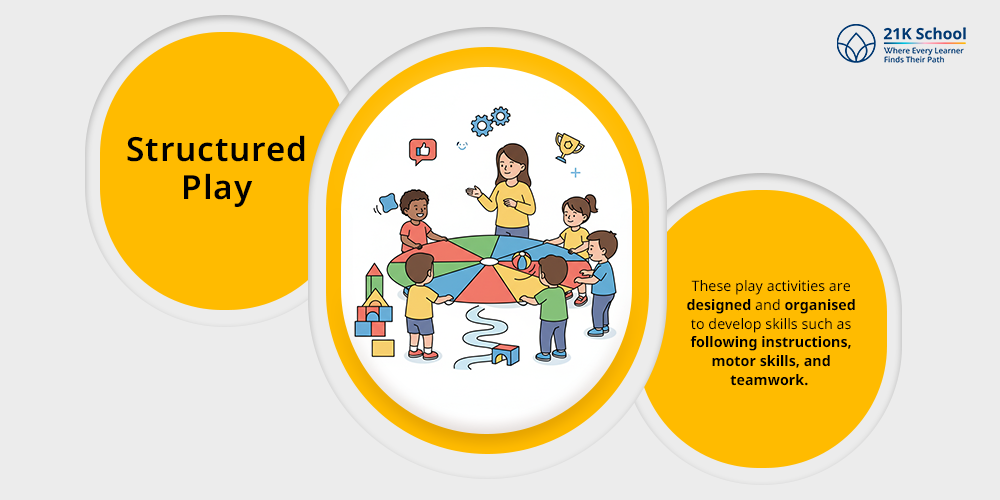
Structured play is play that has a purpose or a goal, which is usually led by parents. These play activities are designed and organised to develop skills such as following instructions, motor skills, and teamwork.
Traditionally, this type of play is also known for being the discipline of the mind. Structured play is mostly demanded by parents or teachers since it is led by an adult. Mostly, structured play includes physical games such as board games, puzzles, ball games, and educational online games for kids .
2. Unstructured Play
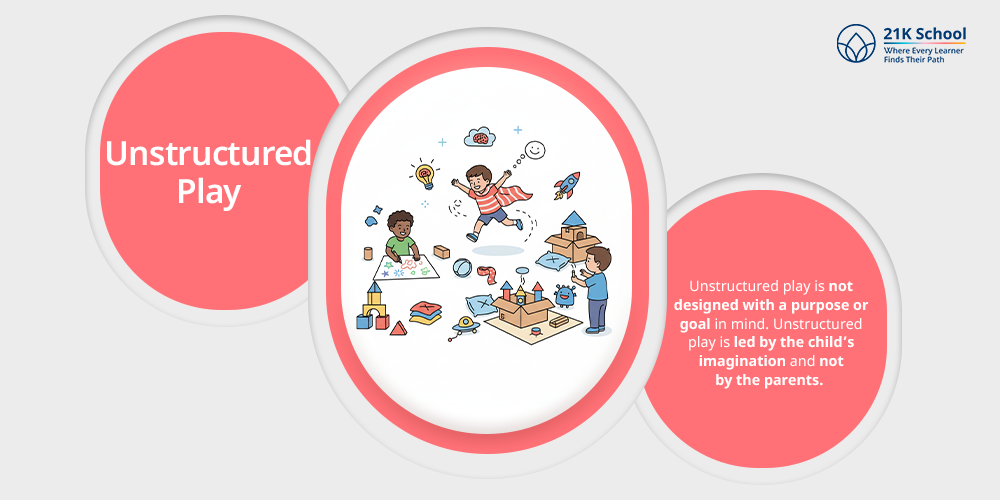
Unstructured play is not designed with a purpose or goal in mind. Unstructured play is led by the child’s imagination and not by the parents. This play opens a broad plane for a child’s creativity.
Some of the most common activities include movements, paper games, indoor games, outdoor games and many more. Unstructured games can include movement games, writing games, ballgames, and many more. Unstructured games don’t follow any specific rules or objectives like structured games.
What Are the Stages of Playgroup Age?
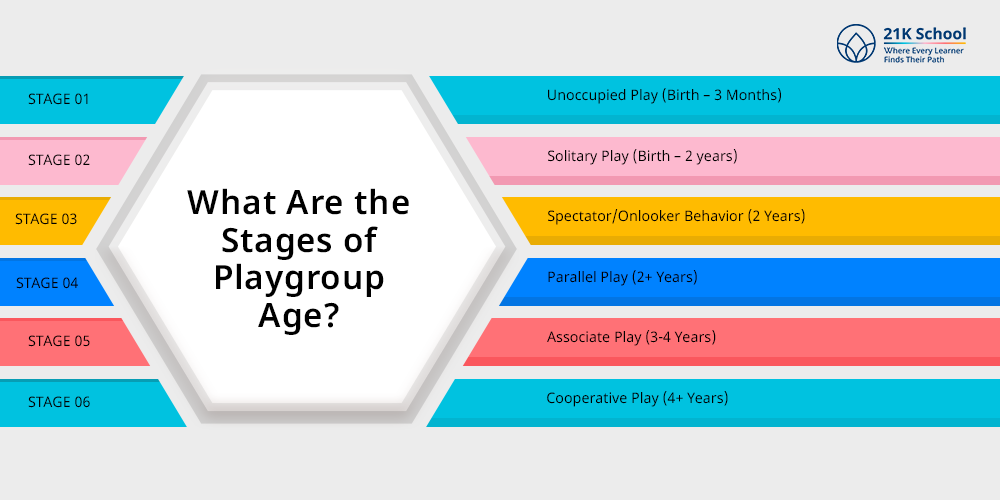
The playgroup age of children denotes several stages which are important for children to grow and develop socially, emotionally, and cognitively. Playgroup age has a significant impact on children because it helps build independence and concentration.
Playgroup age is a period of development and it is helpful. Each stage supports different aspects of a child’s development and, depending on their environment, mood, and comfort level, children may move back and forth between stages.
1. Unoccupied Play (Birth – 3 Months)
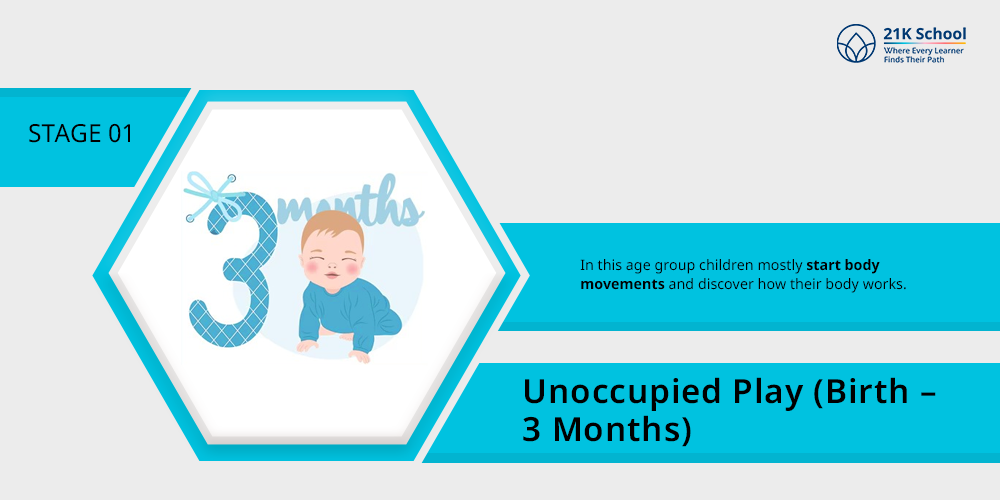
Unoccupied play is a playgroup stage between the age group of birth to 3 years. In this age group children mostly start body movements and discover how their body works. This movement includes hand shaking, movement of legs and arms, head nodding and so on.
At the initial stage these signs were considered as the first stage of play. Children can help their kids to encourage unoccupied play by letting them move freely.
2. Solitary Play (Birth – 2 years)
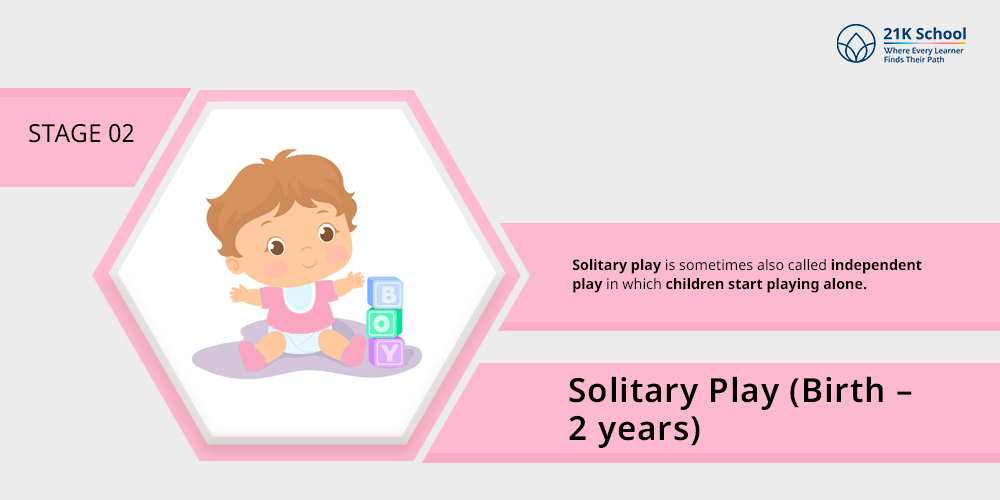
Solitary Play is the age group of children between the age of birth to 2 years. Solitary play is sometimes also called independent play in which children start playing alone.
As this is the initial stage of their growth they often find it difficult to socialise with others due to lack of collaboration skills . In solitary play children play on their own and indulge in self-exploration. This helps in enhancing their creative thinking skills and analytical skills.
3. Spectator/Onlooker Behavior (2 Years)
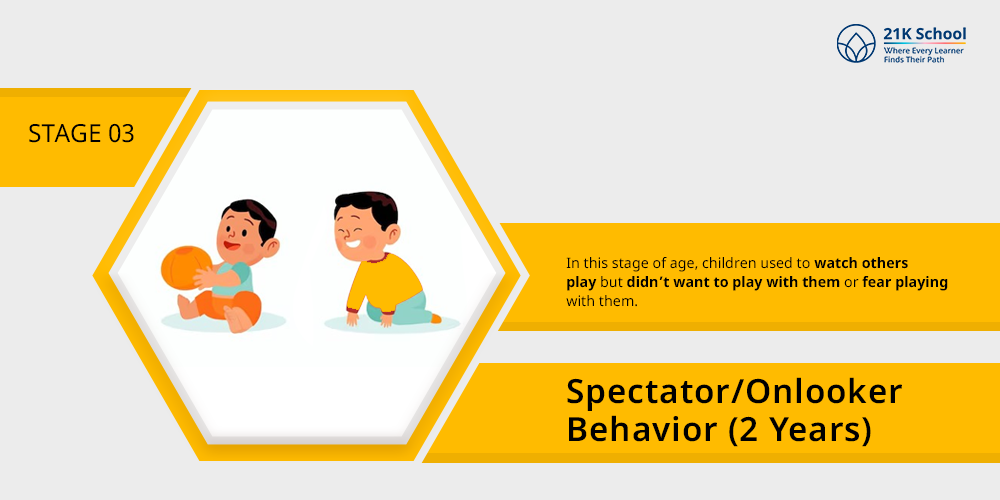
Spectator or onlooker behaviour is an initial stage of observation in which children observe others. In this stage of age, children used to watch others play but didn’t want to play with them or fear playing with them.
This age enhances childrens mental health as well as allows them to experience indirect actions. At this age children will try to talk about their observations and feelings towards others with their parents.
4. Parallel Play (2+ Years)
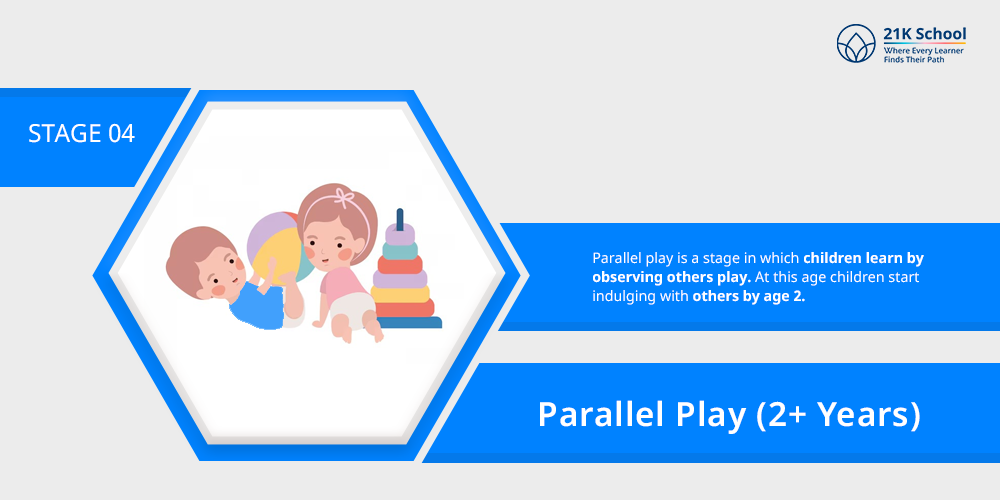
Parallel play is a stage in which children learn by observing others play. At this age children start indulging with others by age 2. In the stage of parallel play children learn by indulging in activities as well as utilising different toys.
In this stage, children explore on their own and indulge in activities of their own even but still aware of others play.
5. Associate Play (3-4 Years)
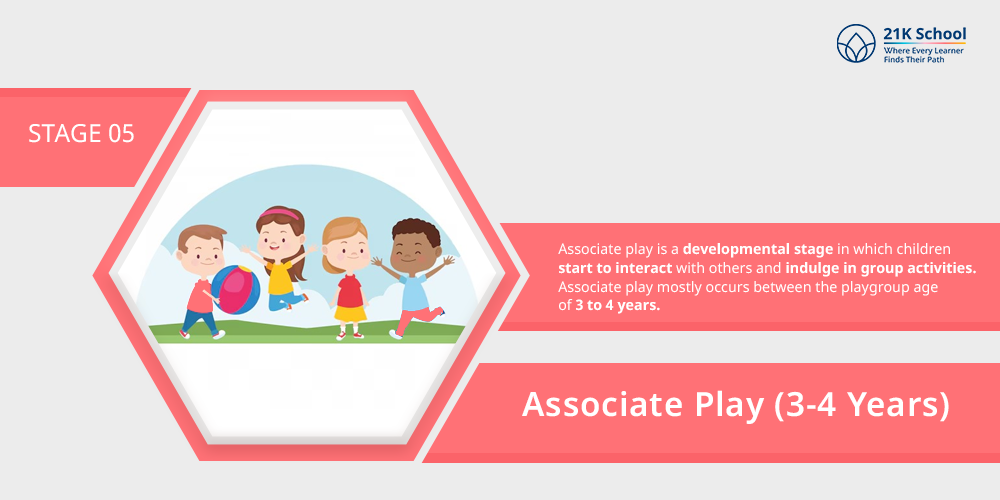
Associate play is a developmental stage in which children start to interact with others and indulge in group activities. Associate play mostly occurs between the playgroup age of 3 to 4 years.
In this stage children play their own game or activities related to children around them. Children try to play on their own or with others but don’t interact with others. However, associate play enhances their problem-solving skills among them as well as boost their memory retention.
6. Cooperative Play (4+ Years)
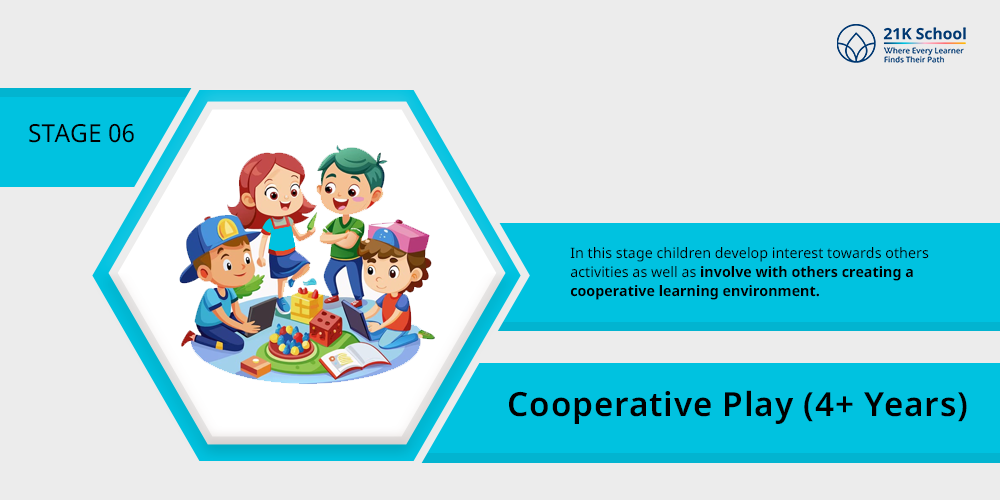
Cooperative play is the final stage in which children start to play with others. In this stage children develop interest towards others activities as well as involve with others creating a cooperative learning environment.
In this stage children develop cognitive skills as well as participate in playing and learning activities. This also allows kids to develop emapthy as well as emotional intelligence towards others.
Why Play is Important for Child Development?
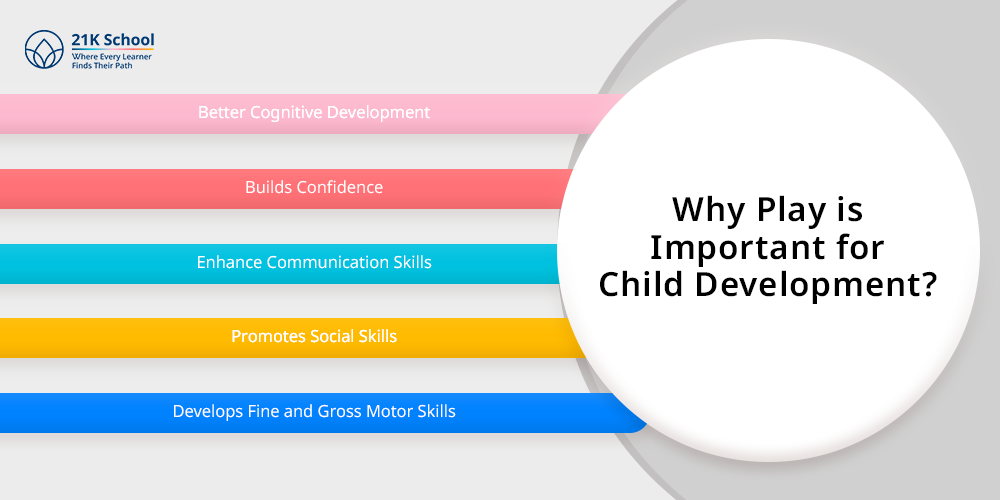
Play is Important for children because it allows them to develop confidence as well as enhance their cognitive development. Child play at an appropriate age group is essential as it prepares them for life skills.
Basically, children start indulging in plays at different stages between age 1 to 5. Through play kids become active and responsible for their learning skills. Here is why play is important for child development.
1. Better Cognitive Development
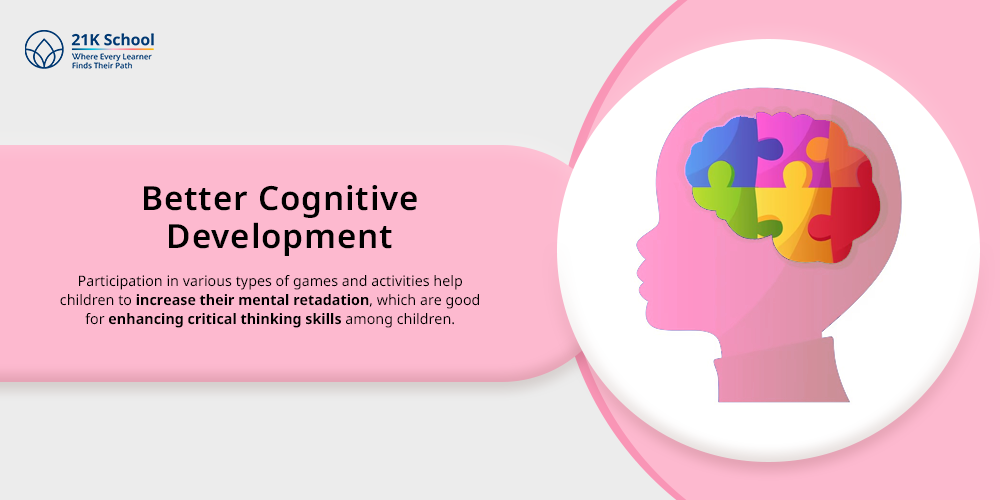
Play is a key aid in building a child`s cognitive development and helps in strengthening their cognition.
Participation in various types of games and activities help children to increase their mental retadation, which are good for enhancing critical thinking skills among children. Enhanced cognition allows children to engage in education and develops interest towards learning.
2. Builds Confidence
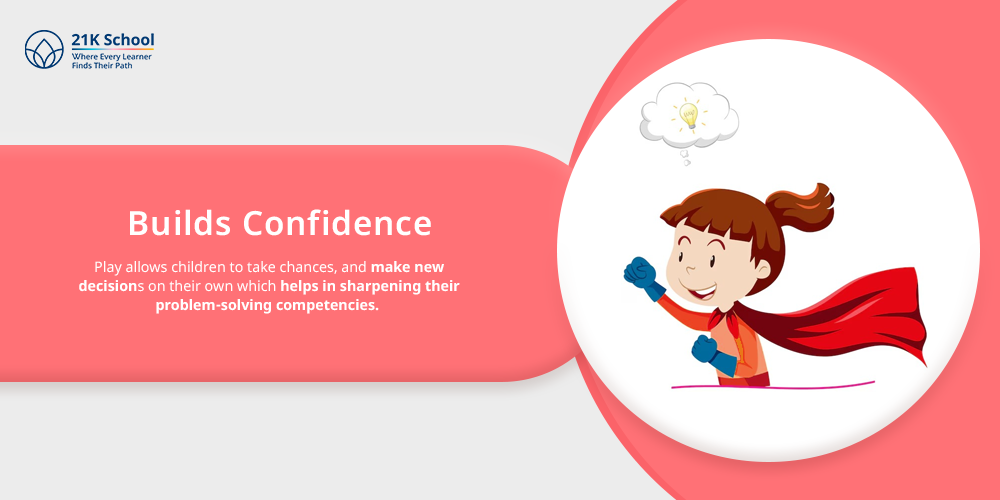
Play allows children to take chances, and make new decisions on their own which helps in sharpening their problem-solving competencies.
As a result, they will form a strong foundation and belief in their abilities. Confidence allows them to explore their limits on their own.
3. Enhance Communication Skills
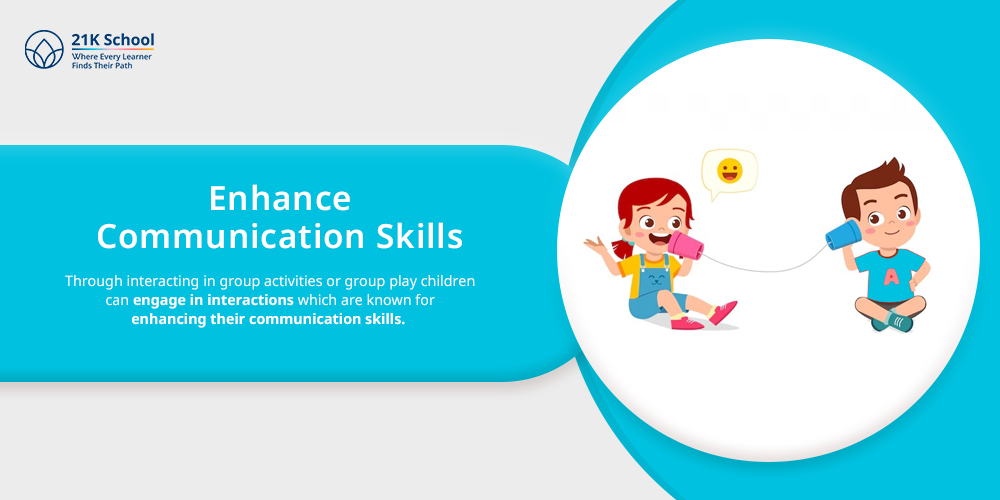
Indulging in plays allows children to enhance their communication skills . Through interacting in group activities or group play children can engage in interactions which are known for enhancing their communication skills.
Through proper communication children are better able to share their viewpoints and perspectives with others. Proper eye contact communication allows children to develop an active mindset as well as improves their communication skills.
4. Promotes Social Skills
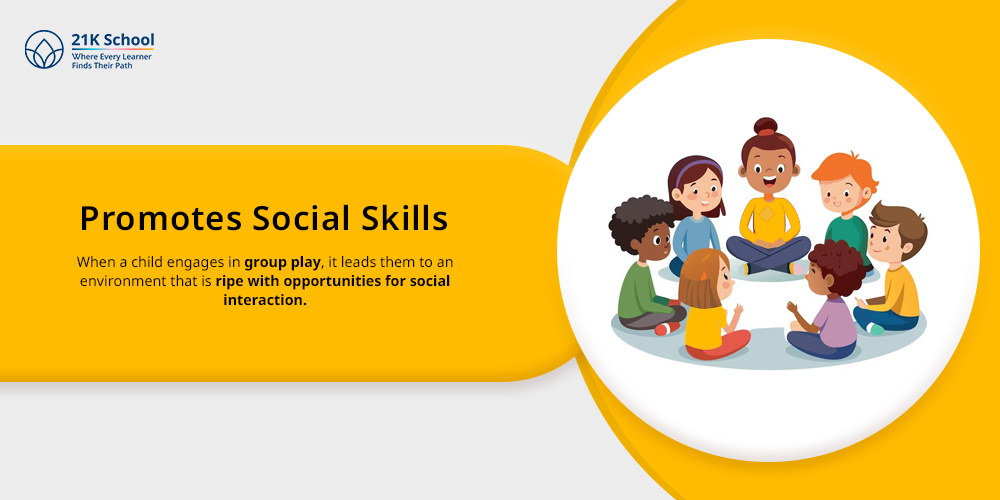
The most effective way for a child to improve their social skills is through playing with other children. When a child engages in group play, it leads them to an environment that is ripe with opportunities for social interaction.
Playful and fun learning activities help children to build their social skills as well as prepare children for improving their memory cognition.
5. Develops Fine and Gross Motor Skills
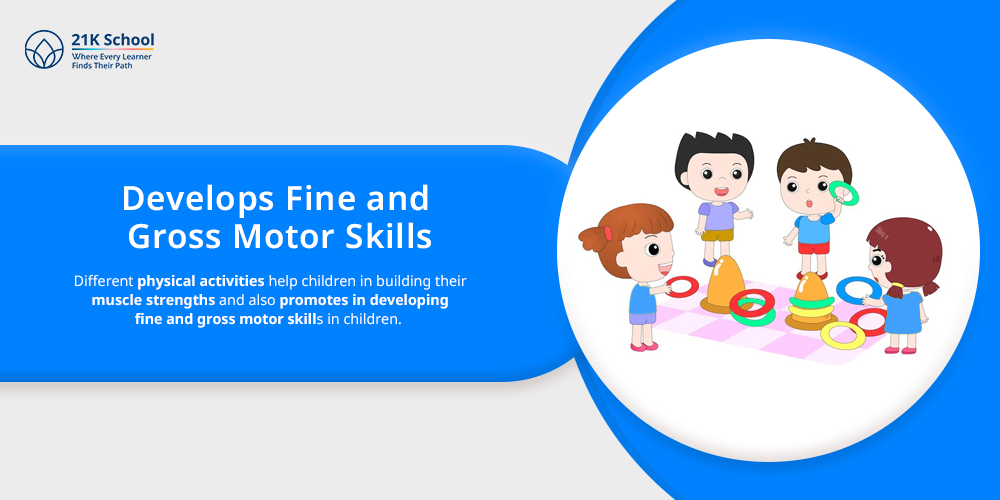
Play is the premier way to enhance a child`s fine motor skills as well as gross motor skills . Different physical activities help children in building their muscle strengths and also promotes in developing fine and gross motor skills in children.
This also helps in improving the hand eye coordination as well as improves mental retention among children. This also helps in improving children’s overall health and mind.
Playgroup Benefits by Starting Age
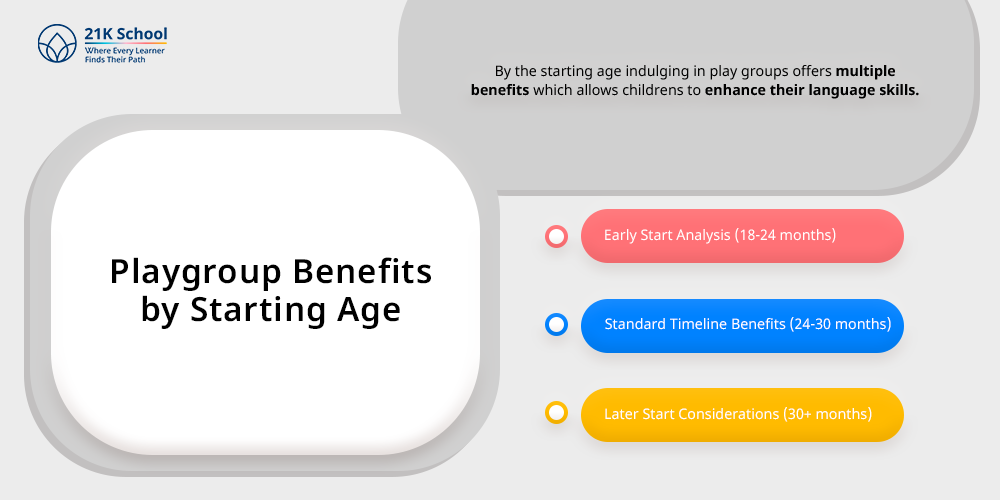
By the starting age indulging in play groups offers multiple benefits which allows childrens to enhance their language skills . Playgroups are divided into three categories such as early start analysis (18-24) months, standard timeline benefits (24-30), later start considerations (30+ months).
With each stage children develop play skills and social skills as well. Here you can check the benefits of playgroups by different age groups.
1. Early Start Analysis (18-24 months)
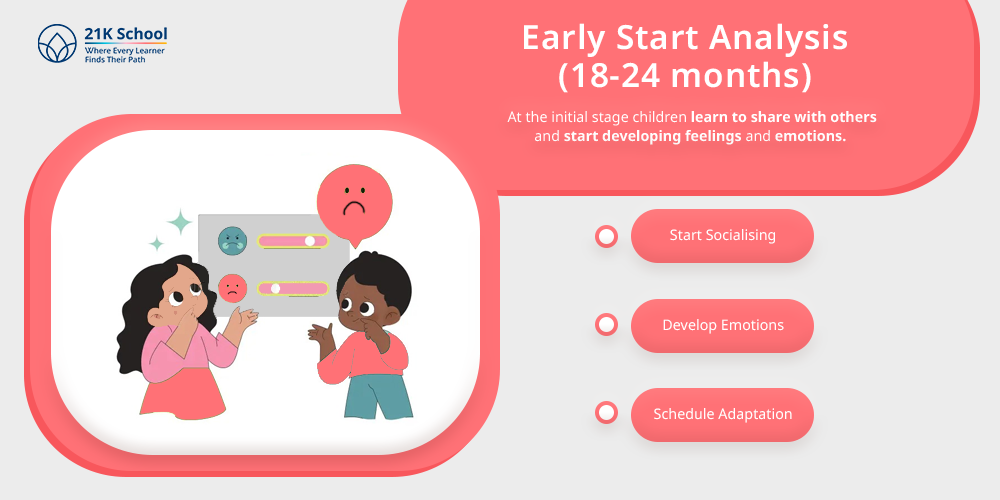
Early start analysis is the early beginning of age between 18 to 24 months, in which children learn to play and explore their movements. The benefits of early start analysis 18 to 24 months, are mentioned below.
1.1. Start Socialising
Early start analysis allows children to start socialising with others. At the initial stage children learn to share with others and start developing feelings and emotions. This stage makes sure that children start making connections with the other children.
1.2. Develop Emotions
At this stage childrens start developing emotions and stronger bonds. This starts from their parents, where they experience emotional connections with them, resulting in better child- parent relationships .
1.3. Schedule Adaptation
Children get used to standard routines or study schedules from a very young age. Following a structured routine at a tender age is truly beneficial in school time. So parents should have and should set routine sessions for activities, which will find students or groups of students learning in a well designed environment.
2. Standard Timeline Benefits (24-30 months)
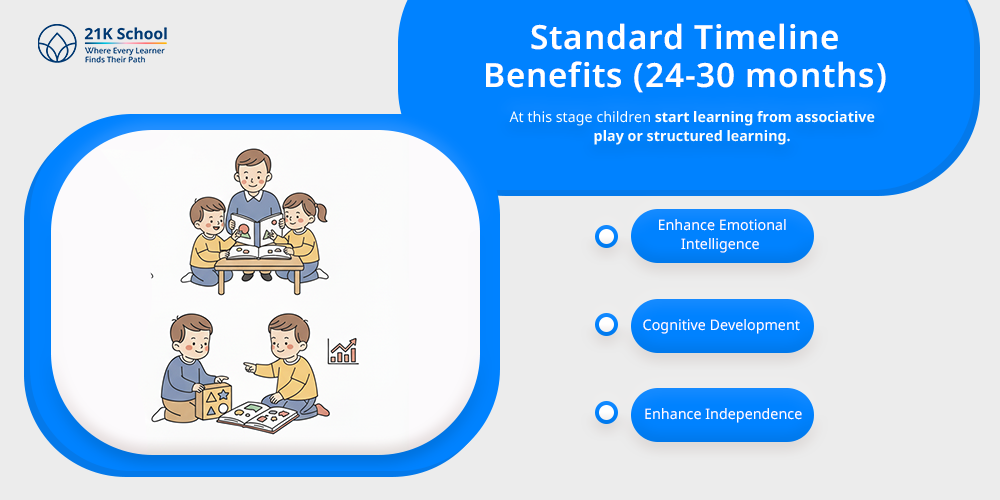
Standard timeline denotes the age of 24 to 30 in which students learn from different perspectives. At this stage children start learning from associative play or structured learning. Benefits of standard timeline benefits are mentioned below.
2.1. Enhance Emotional Intelligence
Children between the age group of 24 to 30 start developing emotional intelligence. In this stage children develop proper control over their emotions and thoughts which allows them to interact with others.
Through emotional intelligence kids can better be able to understand the feelings of others and allow them to develop empathy towards others.
2.2. Cognitive Development
This age group is important for development of cognitive learning , as in this stage children start vocabulary skills as well as indulge in activities which require practical knowledge .
Better cognitive development allows children to enhance their confidence as well as allows them to develop a deeper understanding of concepts.
2.3. Enhance Independence
At the initial stage of 24 to 30 students start developing a sense of independence, in which they want to explore and discover new things on their own. This independent nature allows them to experience new things on their own as well as develop confidence.
3. Later Start Considerations (30+ months)
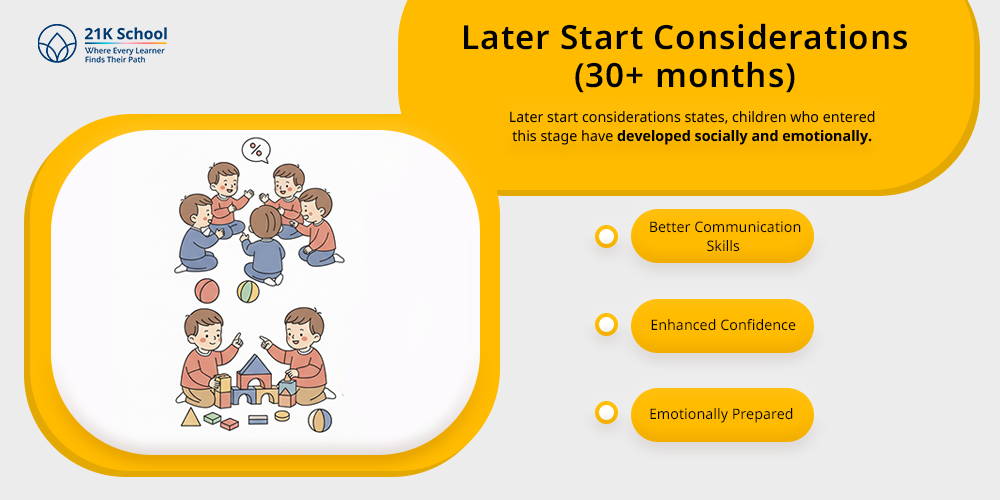
Later start considerations states, children who entered this stage have developed socially and emotionally. This stage denotes children who have crossed the age of 30 months, and are able to adapt as per any situation. The following are the benefits of later start considerations.
3.1. Better Communication Skills
Children develop better communication skills at this age group which enhances their learning efficiency. By indulging in activities and play children are better able to express their feelings and emotions.
Through indulging in group activities and social projects children are better able to develop collaboration with others.
3.2. Enhanced Confidence
By this age children develop confidence which allows them to participate in group activities as well as enhances their problem solving techniques . Through better confidence children are better able to express their thoughts as well as improve their cognitive learning.
3.3. Emotionally Prepared
This final stage of group play allows students to emotionally prepare for the programs. Proper emotional preparation allows children to actively participate in the learning process through asking questions and dialogue.
This also allows children to develop an active mindset which is important for positive outcomes.
Conclusion
Understand playgroup appropriate ages to bake with your toddler which will help you know the child’s progress initially. Children start to pretend to play around 1.5 years old. By now, kids have mastered early games, can do simple puzzles, and start to love completing the scenes you build for them.
Play that comes from within will make them intellectually curious, emotionally resilient as well as socially able. Any kind of play that the child is doing now is perfect for them. These activities will boost your child’s confidence, physical and social skills. It makes them ready for the further years of formal education .
